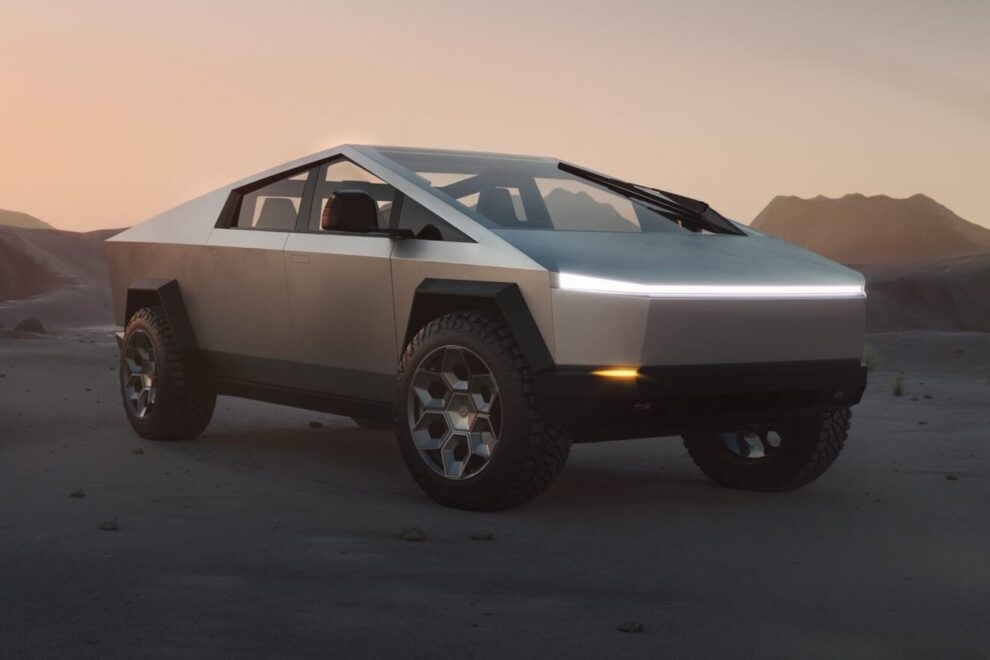Less than a week after Tesla announced the first deliveries of its much-hyped Cybertruck to customers, WTR has identified trademark registrations that suggest the automaker may encounter legal hurdles in introducing its futuristic electric vehicle to the Asia-Pacific, European and South American markets.
Tesla CEO Elon Musk unveiled the first Cybertruck in November 2019 – the same month and year in which the movie Blade Runner was set. The cyberpunk-inspired truck was launched alongside a graffiti-themed Cybertruck logo and received a staggering 250,000 pre-orders within days of the announcement. Reaction to the car’s unusual design was mixed. Syd Mead, the artistic director of Blade Runner, described the Cybertruck as “stylistically breathtaking”, while automotive designer Adrian Clarke claimed the design was “a low polygon joke that only exists in the fever dreams of Tesla fans that stands high on the smell of Elon Musk’s flatulences”.
After numerous postponements, serial production of the Cybertruck began last month, with the first 12 production units delivered to customers. At present, Tesla has stated that the Cybertruck will be available exclusively in North America, with no current plans for release in other global markets. However, Tesla only stopped receiving pre-orders for the Cybertruck from outside North America after May 2022, so many of the quarter-of-a-million pre-orders are from customers in other jurisdictions. According to a March 2020 article, approximately 15% of pre-orders came from outside North America.
Therefore, while not necessarily in the near future, Tesla could be hoping to sell its Cybertruck in different markets at some point – at least as a means to fulfill preorders.
However, could a slew of registered trademarks related to Cybertruck cause headaches for Tesla in any future efforts to expand? After identifying registered trademarks in Australia, Brazil and the United Kingdom, WTR spoke with experts in each of those jurisdictions to understand the possible implications.
Australia
Outside the United States and Canada, Australia is reportedly home to the highest number of pre-orders of the Cybertruck, with approximately 3% of the total. Despite that, Tesla recently confirmed that Cybertruck will not be heading Down Under for the foreseeable future. And to date, Tesla has not filed a trademark for CYBERTRUCK in Australia.
That does not mean that there are no Cybertruck-related trademarks registered in Australia. In May 2020, Smart Cookie Pty Ltd filed a word mark for the term CYBERTRUCK and a figurative mark for the Cybertruck graffiti logo. Both applications cover Class 12 for automotive land vehicles. While the word mark was not accepted and subsequently lapsed, the logo mark reached registration in January 2021. Talking to WTR, Phillips Ormonde Fitzpatrick principal Marine Guillou says that the word mark presumably lapsed due to “lacking distinctiveness”, while the logo was accepted because it is “very distinctive”. She adds: “Australia has a strict approach to assessing distinctiveness. It is not uncommon for a trademark to be accepted in other jurisdictions but not in Australia on the basis of lack of distinctiveness.”
Nonetheless, Smart Cookie now holds the registered trademark in Australia for the Cybertruck logo. It is unclear why Smart Cookie sought a registration that appears to relate to an electric vehicle – the company is the owner of a Sydney-based healthy snacks retailer called Tong Garden, according to its terms and conditions page.
Indeed, Guillou tells us that it “is surprising” that Tesla did not oppose the application for the Cybertruck logo “as it is clearly a copy” of Tesla’s logo. “This means Tesla may have to pursue a cancellation action on the ground that the mark was filed in bad faith or that use of the mark would be contrary to law (as the logo is an artistic work and protected by copyright, it is likely that its reproduction would constitute copyright infringement),” she notes. “This is a Federal Court action and more costly than an opposition. Alternatively, they could also negotiate with Smart Cookie to get the mark assigned to them.”
WTR reached out to Smart Cookie, but has not received a response.
Brazil
At present, Tesla has expanded its sales of electric vehicles across North America, Europe and Asia – but one continent it has not touched so far is South America. That may be set to change. According to Electrek in October, Tesla recently posted a job opening for a country manager in Chile, which the trade title suggests “is generally the first person hired when Tesla expands in a new market”.
While it may be early days in Tesla’s rollout of its vehicles to a vast new market, protection of its brand names will be key for success. And it appears, at least when it comes to the Cybertruck, it could face an issue in Latin America’s biggest single market: Brazil.
In March 2020, a trademark was filed at the Brazilian Patent and Trademark Office (INPI) for the word mark CYBERTRUCK in Class 12 (vehicles). It was lodged by an individual named Eleandro Batista de Oliveira, and reached registration in November 2020.
Talking to WTR, BMA Law lawyer Jana Fraccaroli says the ownership of the CYBERTRUCK mark could present a major obstacle for Tesla in Brazil if Batista de Oliveira decided to take action. “He could sue Tesla for trademark infringement if and when Tesla launches its Cybertruck car in Brazil, including a possible preliminary injunction seeking the prohibition of the commercialisation of Tesla’s car in the country,” she explains.
On the flipside, Tesla could challenge the validity of the mark. Options include a judicial nullity action before 24 November 2025, or requesting the cancellation of the registration due to a lack of use of the mark (if the mark is not used by the applicant after 24 November 2025), Fraccaroli says. It may also be helpful that Tesla first filed a CYBERTRUCK word mark at the USPTO in November 2019, she adds, and there appears to be no evidence that Eleandro Oliveira has used the mark in relation to the goods and services that it covers.
“In fact, I did not find any evidence that Eleandro Oliveira is effectively engaged in this market segment, even though in the period between 2018 and 2020 he applied for the registration of 22 marks to identify cars, vehicles and related accessories,” Fraccaroli states. “Therefore, I believe that Tesla would have arguments and grounds to seek the cancellation of Eleandro Oliveira’s registration in court based on its prior use of the mark CYBERTRUCK and on a possible bad-faith of Eleandro Oliveira in registering such mark in his name.”
Beyond the 22 marks related to automobiles, further evidence finds that Eleandro Oliveira filed more than 150 trademark applications before INPI between 2018 and 2020. Those applications covered a huge array of industry sectors, including alcoholic beverages, cannabis-based products, cosmetics, financial services and pharmaceutical products. On top of that, he is involved in countless ongoing legal actions before the Brazilian courts, including a number of trademark disputes. One of those disputes is against another automaker, Fiat Chrysler.
The dispute between Eleandro Oliveira and Fiat Chrysler may give a clue on why the CYBERTRUCK mark was filed, Fraccaroli says. “In the court action, Fiat Chrysler claims that he practices trademark squatting by registering in his name several third-party marks belonging to different market segments – which are already applied for and registered in other countries, but not in Brazil – and then seeking compensation for the alleged misuse of these marks by their true owners when such companies expand their activities to Brazil, or trying to negotiate the sale or licensing of these marks to their actual owners,” she explains. “If Fiat Chrysler’s claims are accurate, it might be an indication of why Eleandro Oliveira registered the mark CYBERTRUCK in Brazil.”
WTR attempted to reach out to Eleandro Oliveira, but has not received a response.
United Kingdom
One jurisdiction that the Cybertruck is expected to enter after North America is Europe, where Tesla already has a significant share of the electric vehicle market. However, according to media reports, strict safety standards may create a major stumbling block. According to the Daily Mail, the vehicle “will need strong modifications to the basic structure before it can enter the European market”, including the front of the vehicle’s ability to “absorb energy to protect pedestrians”.
Another relatively minor obstacle, at least in the UK market, could be the existence of a third-party registered CYBERTRUCK trademark. Filed in May 2020 by UK resident Sayif-ullah Rasheed, the trademark covers Class 12 (land automotive vehicles) and Class 25 (clothing) and reached registration in August 2020. Unlike the Brazilian applicant, Rasheed has only one other trademark to his name – for the term SYON LOUNGE, the name of a restaurant located approximately eight miles from the applicant’s address.
Unlike the jurisdictions that we have examined in this article, Tesla has one major advantage in the United Kingdom; it owns an earlier CYBERTRUCK trademark, filed two weeks before Rasheed’s application, also covering Class 12. “It would appear that Tesla’s prior UK trademark registration, which claims priority from an earlier US trademark registration from 2019, trumps Raheed’s later UK registration,” says chartered trademark attorney and HGF partner Lee Curtis. “On top of that, it seems that Tesla’s 2019 US trademark application and soft launch of brands was fairly widely reported in the press at the time, indicating Tesla had an interest in the brand at that time. Rasheed may have filed his registration innocently, but if it could be proved he had knowledge of Tesla’s Cybertruck brand and his filing was prompted by that knowledge, his registration might be open to challenge on the basis of bad faith unless he could show some prior use or interest in the brand.”
It is worth remembering, however, that Rasheed’s registration also covers clothing, which is not included in Tesla’s registration. “It’s possible that Rasheed may try to capitalise on Tesla’s success by trying to produce merchandise,” says Harbottle & Lewis head of trademarks Sharon Daboul, adding: “To be honest, I am surprised that Tesla has not already taken action against this later registration. Class 12 should be relatively easy to knock out on the basis that they have an earlier registration for an identical mark covering identical goods (so there is no need to show that there is a risk of consumer confusion). While Class 25 may take a little more effort, Tesla could potentially rely on the huge popularity of their unveiling event (under the reputation ground) and potentially also bad faith too. In my view, allowing the registration to sit on the register could weaken the distinctiveness of Tesla’s brand and cause problems in future if Rasheed does try to use his trademark.”
Source : WTR
















